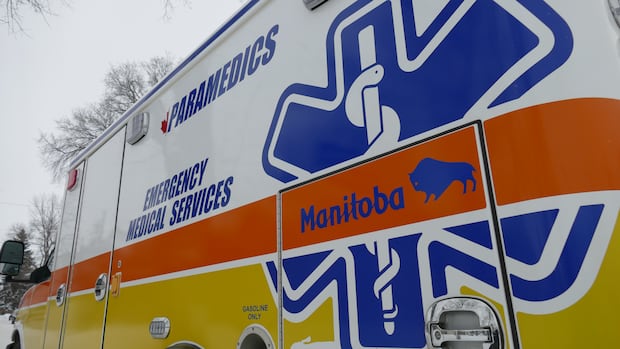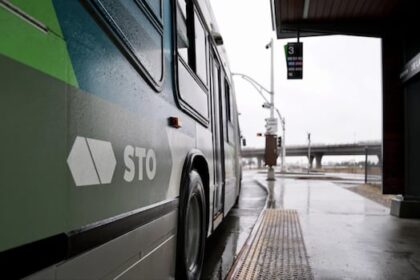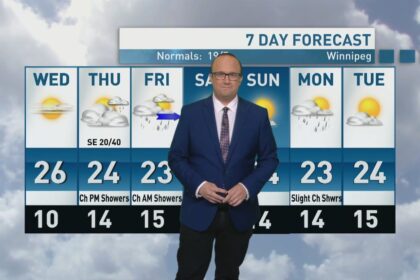ManitobaManitoba hopes to help rural municipalities recruit more emergency medical responders with new financial support for students and in-community training programs, but the union for rural paramedics is calling it a step backwards for rural emergency medical services.’You need 2 fully trained paramedics to handle most emergency calls’: MAHCP presidentOzten Shebahkeget · CBC News · Posted: Nov 26, 2025 10:49 PM EST | Last Updated: 3 hours agoListen to this articleEstimated 6 minutesThe audio version of this article is generated by text-to-speech, a technology based on artificial intelligence.Manitoba is introducing new bursary and training programs to train and recruit emergency medical responders in rural parts of the province, but the union representing rural paramedics says they’re not trained to do many of the tasks that paramedics can. (Riley Laychuk/CBC)Manitoba hopes to help rural municipalities recruit more emergency medical responders with new financial support for students and in-community training programs, but the union for rural paramedics is calling it a step backwards for rural emergency medical services.Rural municipalities often depend on emergency medical responders — the most basic level of emergency medical services — to provide emergency services and keep people in their communities, Premier Wab Kinew said in a Wednesday news release.The province wants to make EMR training more accessible with a new $5,000 bursary for students who complete the program training, the release says. Graduates who receive the bursary will enter a one-year return-of-service agreement once hired.The province has also partnered with CritiCare Paramedic Academy to offer in-community EMR training, which it says will take place in the Interlake town of Arborg this year.By next fall, the province says between 50 to 60 EMRs are expected to graduate, complete the Canadian Organization of Paramedic Regulators exam, and become eligible to be hired into provincial emergency medical services.The move will create a “clear pathway” for people to become EMRs, who can then go on to train to become primary and advanced care paramedics, Health Minister Uzoma Asagwara told reporters on Tuesday.”This is a step that municipal leaders and communities have been asking for for years.”Jason Linklater, president of the Manitoba Association of Health Care Professionals, says EMRs are useful when it comes to transporting stable patients — and it’s quicker and cheaper to train an EMR than a primary care paramedic (PCP) — but they can’t do much to help someone in a medical emergency as compared to a paramedic.For example, the union says EMRs cannot diagnose a patient with an illness or injury, insert an intravenous line, give a needle injection into a patient’s muscle, or provide controlled medications for serious conditions like heart attacks, seizures or psychosis.Linklater says the NDP government promised to hire 200 new paramedics, but have only added 18 in the two years they’ve been in office — with no plan to retain, train or recruit more.”Shared Health and our provincial leaders are opting for fast and cheap, and a long-term solution that isn’t good for rural Manitobans — or any Manitobans, when what you need is a highly skilled paramedic to treat and stabilize a patient,” he said.”The bottom line is, you need two fully trained paramedics to handle most emergency calls, cardiac arrests, severe trauma, [and] violent, unstable patients.”His union has recommended that the province use return-of-service agreements that would include a requirement for EMRs to enrol in a PCP program within a defined period of time, but the province is “just not listening.””Something has to be done, but let’s do it in the right way to ensure that we’re solving a long-term problem, and not just a Band-Aid that becomes a permanent Band-Aid going into the future,” he said.”Quite frankly, we’ll see if that’s the case or not in two years from now.”Linklater’s concern is that the province is “changing the face of rural paramedicine” by reducing services.”If it’s rolled out the way that I interpreted it today, it will take Manitoba backwards.”Jason Linklater, president of the Manitoba Association of Health Care Professionals, says he’s worried that the province will reduce paramedic services in rural areas. (CBC)Asagwara disagreed.”It’s absolutely not a reduced level of care, it’s an alternative level of care, and I think that’s a really important distinction to make,” they said.”We’re going to build on this to ensure that this alternative level of care is one that is as strong as possible.”Asagwara did not respond when asked whether the province was introducing the new measures to attract more EMR students because it cannot find enough paramedics.”What we know is that training EMRs — a low barrier, more accessible way to joining emergency services, and to help people in your communities — is the right step to take.”Virden Mayor Tina Williams says the move will help small towns like hers.”In a perfect world, we would have enough paramedics to fill every ambulance,” she told CBC News. “But I don’t live in that world, and having more hands in an ambulance to help…. I can only see that as a good thing.”Training EMRs locally means that they’re likely to stick around, she said.”Maybe this is someone’s gateway to being a paramedic who can just not pack up and leave Virden, for whatever reason, to take that training.”‘We need to go farther’Kelly McMechan, a licensed paramedic and the reeve of the Municipality of Deloraine-Winchester in southwestern Manitoba, says Wednesday’s announcement is a great first step to improve emergency services in that part of the province.”I don’t want that to become the norm,” he said.”I feel we need to go farther if we’re going to fill all these positions, and get to where EMS can actually expand and grow the way it needs to.”His community sponsored a resolution put forth at the Association of Manitoba Municipalities’ annual fall convention this week, asking the province to expand training and resources for PCPs.The resolution proposed that every vacant PCP position in the province be matched with a person hired to immediately begin PCP training, adding that the new training and employment model should also include mentorship and part-time work opportunities.McMechan says southwestern Manitoba is in a “crisis” when it comes to accessing emergency medical services.”I feel they could pay [for] a lot more of the training, and get a lot more bodies in the seats.”With files from Ian Froese
Wednesday, 4 Mar 2026
Canada – The Illusion
Search
Have an existing account?
Sign In
© 2022 Foxiz News Network. Ruby Design Company. All Rights Reserved.
You May also Like
- More News:
- history
- Standing Bear Network
- John Gonzalez
- ᐊᔭᐦᑊ ayahp — It happened
- Creation
- Beneath the Water
- Olympic gold medal
- Jim Thorpe
- type O blood
- the bringer of life
- Raven
- Wás’agi
- NoiseCat
- 'Sugarcane'
- The rivers still sing
- ᑲᓂᐸᐏᐟ ᒪᐢᑿ
- ᐅᑳᐤ okâw — We remember
- ᐊᓂᓈᐯᐃᐧᐣ aninâpêwin — Truth
- This is what it means to be human.
- Nokoma











